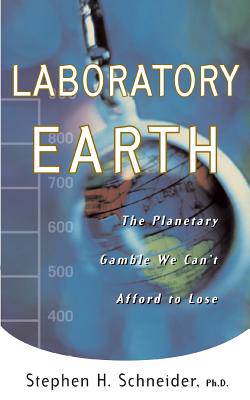
- Afhalen na 1 uur in een winkel met voorraad
- Gratis thuislevering in België vanaf € 30
- Ruim aanbod met 7 miljoen producten
- Afhalen na 1 uur in een winkel met voorraad
- Gratis thuislevering in België vanaf € 30
- Ruim aanbod met 7 miljoen producten
Zoeken
Laboratory Earth
The Planetary Gamble We Can't Afford to Lose
Stephen H Schneider, Steven H Schneider
€ 29,95
+ 59 punten
Uitvoering
Omschrijving
Laboratory Earth taps the relevant knowledge from physical, biological, and social sciences needed to study the planet holistically. This so-called Earth Systems Science fosters a new way to understand the Earth and our roles as inhabitants, with the purpose of building solutions to the bewildering global environment and overdevelopment.Educational, business, health, and governmental organizations often dissect the world into narrow but highly specialized disciplines--economics, ecology, cardiology, meteorology, glaciology, or political science, to name a few. But real world problems, like urban sprawl, public health, poverty, toxic waste, economic development, the ozone hole, or global warming, do not fit neatly into disciplinary boxes. However, author Stephen Schneider asserts that these contemporary issues must be viewed as systems of interconnected subelements. This is especially true for global environmental problems, since they arise from increasing numbers of people demanding higher standards of living and willing to use the cheapest available technologies to pursue these growth-oriented goals, even if the unintended byproducts include land degradation, toxic pollutants, species extinctions, or global climate change. To first understand and then solve such problems, we must learn to view the Earth and our socioeconomic engine as one integrated system.Schneider, who in the 1970s predicted global warming would become "demonstrable" by the turn of the century, chooses that debate to illustrate how this twenty-first century Earth Systems Science approach works, introducing us to the sharp controversies and highly visible debates among climatologists, ecologists, economists, industrialists, and political interests over the seriousness and solutions to the climate change crisis. He begins with a fascinating journey to the beginning of geologic time on Earth and traces from there the coevolution of climate and life over the next four billion years. Along the way we learn about the Gaia Hypothesis, the demise of the dinosaurs, and the likelihood of an impending ice age.Schneider traces our climatic history not only from the beginning and up to the twentieth century, but deep into the twenty-first as well. He depicts the next one hundred years as a potentially perilous period for climate and life--unless we citizens of Earth recognize and then work to control the unintended global scale experiment we are foisting on ourselves and all other life on "Laboratory Earth." This "lab" is not built of glass, wires, and tubes, but of insects, soils, air, oceans, birds, trees, and people. While no honest scientist can claim to have clairvoyant vision into the twenty-first century, Schneider optimistically demonstrates that enough is already known to command our attention and to insure that the juggernaut of human impacts on Earth doesn't turn into a gamble we can't afford to lose.
Specificaties
Betrokkenen
- Auteur(s):
- Uitgeverij:
Inhoud
- Aantal bladzijden:
- 192
- Taal:
- Engels
- Reeks:
Eigenschappen
- Productcode (EAN):
- 9780465072804
- Verschijningsdatum:
- 1/09/1998
- Uitvoering:
- Paperback
- Formaat:
- Trade paperback (VS)
- Afmetingen:
- 135 mm x 203 mm
- Gewicht:
- 176 g

Alleen bij Standaard Boekhandel
+ 59 punten op je klantenkaart van Standaard Boekhandel
Beoordelingen
We publiceren alleen reviews die voldoen aan de voorwaarden voor reviews. Bekijk onze voorwaarden voor reviews.











